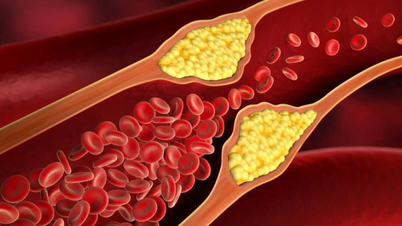Eating late at night increases the risk of high blood fat and fatty liver in middle-aged people because of the following effects:
Circadian rhythm disorders
The human body has an internal biological clock that helps control hormone secretion, energy metabolism and liver function. When eating late, especially after 9 p.m., the digestive and energy metabolism processes deviate from the biological rhythm - which prioritizes daytime activities, according to the health website Medical News Today (UK).

Eating late at night may increase the risk of fatty liver disease
PHOTO: AI
According to research published in the journal Cell Reports , eating dinner too late disrupts the liver's circadian rhythm, reduces the activity of fatty acid oxidation enzymes, and increases the expression of genes related to lipid synthesis and storage. As a result, excess energy is easily converted into triglycerides. This is a prerequisite for fatty liver and dyslipidemia.
Not only that, some scientific evidence also shows that people who eat dinner late have higher blood glucose and insulin levels than those who eat early, despite consuming the same amount of calories. This proves that metabolism is reduced at night.
Late dinner affects blood lipids
Late-night eating habits are linked to increased triglycerides and “bad” LDL cholesterol, two leading risk factors for heart disease.
The reason is that at night, the activity of the enzyme that breaks down triglycerides will decrease significantly. At the same time, insulin hormone levels remain high if you eat late, increasing the synthesis of triglycerides in the liver. As a result, lipids accumulate in the liver and blood, leading to increased cholesterol.
Increased risk of fatty liver
Non-alcoholic fatty liver disease (NAFLD) is on the rise in middle-aged adults. Dinnertime is a notable factor.
An observational study in Japan, published in the journal Nutrients, showed that people who had a habit of eating dinner within 2 hours before going to bed had a significantly higher risk of fatty liver disease than those who ate dinner earlier, specifically at least 3 hours before going to bed.
Impact on sleep quality
Eating late not only changes the digestive process but also affects the quality of sleep and hormones. When eating late, the body secretes insulin, which reduces the hormone melatonin, which helps sleep deeply. This disruption can easily lead to difficulty sleeping, even chronic sleep deprivation. Sleep deprivation combined with late dinners also increases the accumulation of visceral fat, especially in people over 40, according to Medical News Today .
Source: https://thanhnien.vn/an-toi-muon-co-lam-nguoi-trung-nien-bi-mo-mau-gan-nhiem-mo-185251106134942399.htm







![[Photo] Da Nang: Hundreds of people join hands to clean up a vital tourist route after storm No. 13](https://vphoto.vietnam.vn/thumb/1200x675/vietnam/resource/IMAGE/2025/11/07/1762491638903_image-3-1353-jpg.webp)







































































































Comment (0)